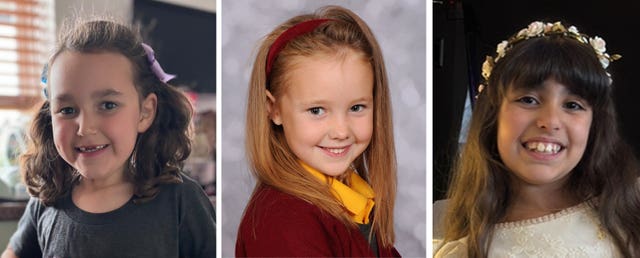Southport killer’s terror threat referral ‘should have been escalated’
The Home Secretary has said the Prevent learning review concluded Axel Rudakubana should have been referred to the next stage of the scheme.

A review into the handling of the Southport child killer under the Government’s counter-terrorism programme Prevent will reveal there was sufficient evidence to consider the teenager a terror threat, it has been reported.
Axel Rudakubana was given a life sentence with a minimum term of 52 years – one of the highest minimum terms on record – for murdering Alice da Silva Aguiar, nine, Bebe King, six, and Elsie Dot Stancombe, seven, at a Taylor Swift-themed dance class in Southport on July 29 last year.
He also attempted to murder eight other children, who cannot be named for legal reasons, as well as class instructor Leanne Lucas and businessman John Hayes.
Three separate referrals were made to Prevent about Rudakubana’s behaviour in the years before the attack, as well as six separate calls to police.

Home Secretary Yvette Cooper had announced a public inquiry will be held to look at any “missed opportunities” to identify Rudakubana’s murderous intent and she ordered a “thorough review” of the Prevent referrals.
According to the Times, the report to be published on Wednesday has concluded counter-terrorism officers were wrong to not escalate his case as a potential terror threat.
It also found there was enough evidence for Prevent officers to refer Rudakubana to the next stage of the scheme, called Channel, which aims to divert individuals from being radicalised.
Ms Cooper told the Times: “What that [the report] concluded was that in this case, he should have been referred to the Channel programme… that too much focus was placed on the lack of ideology.
“Not enough focus was also given to the issues around the fact that there were three different referrals. And it already does include, in the Prevent guidance, the need to look at cases where, for example, there is an obsession with a school massacre or extreme violence.
“Clearly in this case, although the reviews concluded that Rudakubana should have been referred to Channel, he wasn’t. And it raises wider questions for the Prevent programme about the way in which it deals with… some of the cases where there is mixed or unclear ideology.”

It is currently voluntary to take part in the Prevent and Channel programmes, but Ms Cooper told the Times the Government will introduce new terror orders for young people who refuse to engage with them as part of the upcoming Crime and Policing Bill.
Children as young as 10 could be restricted from using the internet under the new youth diversion orders, or face a fine and community sentence of up to six months, the Times reported.
Others aged 18-21 will face up to two years in prison for breaching the order, it added.
The Home Secretary also told the paper plans to ban kitchen knives with a pointed end being advocated by actor and campaigner Idris Elba were also being considered in a bid to tackle knife crime.
Ms Cooper said: “We are looking at the point that Idris Elba has made… we will look at any issue that might make children safer.
“This is an issue that Idris has raised. It’s also an issue [raised by] surgeons who have dealt with knife crime. Victims have also raised this as well in the past. So that’s why we are looking at it.”





